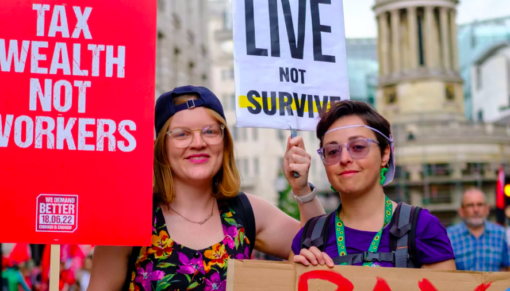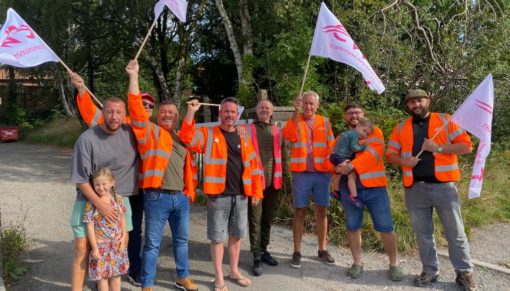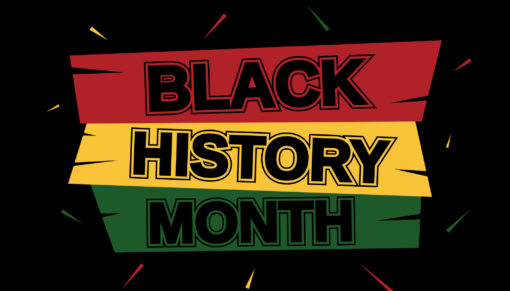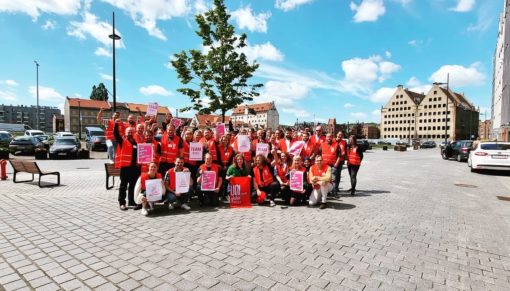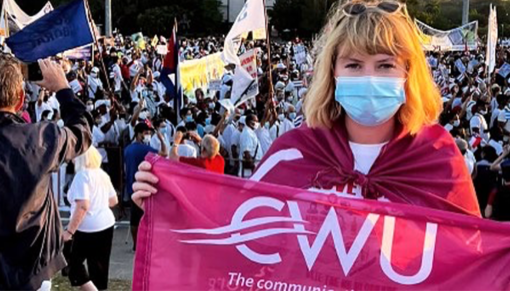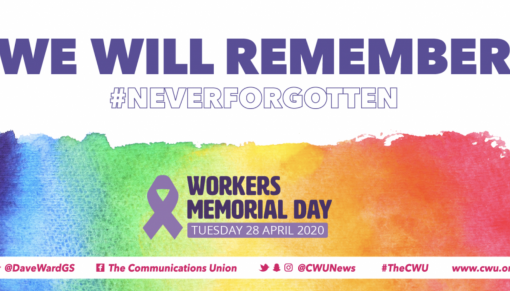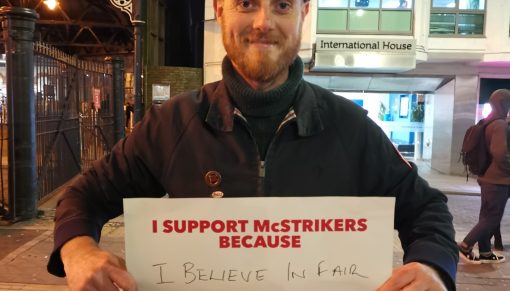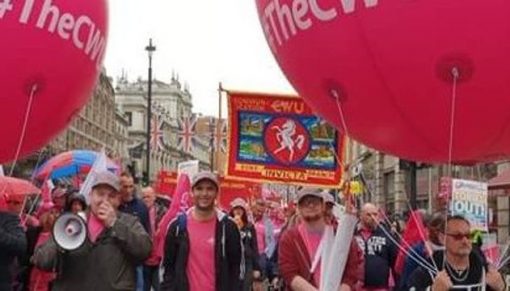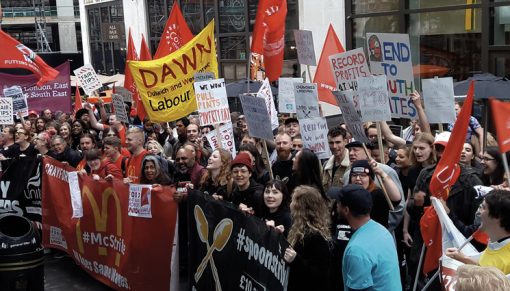GMB Young London: What We Learned from Howl for Housing
October 7 2015
Simon Sapper writes: Beckie Winson is the co-ordinator for the GMB Young Members’ section in London. In this guest blog she tells the story of their fantastic campaign to highlight the scandal of so-called “revenge evictions”, where people are kicked out of their flats for raising perfectly normal and legitimate concerns about the property. The GMB experience on how and why to approach housing as a campaign issue has many similarities with what we in CWUYouth went through. Beckie’s conclusions make valuable reading too. Beckie can be contacted by twitter at @rebeccawinson.
 Our group, which started off as little more than half a dozen people, first decided on housing as a campaign issue over a year ago. Our plan was to run a campaign which would get existing members active and get non-members to join up, the thought being that if we were already doing something, people would want to get involved. We settled on “housing” because as young Londoners it was obviously our first and most immediate concern. Workplace issues didn’t immediately spring to mind because we already knew the union had our back on them. It felt like with housing, however, there was no obvious support structure.
Our group, which started off as little more than half a dozen people, first decided on housing as a campaign issue over a year ago. Our plan was to run a campaign which would get existing members active and get non-members to join up, the thought being that if we were already doing something, people would want to get involved. We settled on “housing” because as young Londoners it was obviously our first and most immediate concern. Workplace issues didn’t immediately spring to mind because we already knew the union had our back on them. It felt like with housing, however, there was no obvious support structure.
 We found out quickly why this was: housing campaigning is so much hassle. Seriously. Our first meeting was spent mapping out all the different issues of the housing crisis, our next three were spent arguing over which of those was most important. Do you campaign on house prices? The lack of social housing? Rent control? Housing conditions? Tenant’s rights? Letting fees? Overcrowding? Where to begin?
We found out quickly why this was: housing campaigning is so much hassle. Seriously. Our first meeting was spent mapping out all the different issues of the housing crisis, our next three were spent arguing over which of those was most important. Do you campaign on house prices? The lack of social housing? Rent control? Housing conditions? Tenant’s rights? Letting fees? Overcrowding? Where to begin?
 In the end we solved it by just getting on with it. We sort of had our minds made up for us: Sarah Teather MP used a private members bill to put forward an amendment which would seriously limit the practice of “Revenge Evictions”, where your landlord can chuck you out for complaining about bad conditions. This had happened to me and a few others in the group already. In my case, our ceiling had actually fallen through due to a flood and the landlord had refused to fix it. When we complained to the council, we got an eviction letter.
In the end we solved it by just getting on with it. We sort of had our minds made up for us: Sarah Teather MP used a private members bill to put forward an amendment which would seriously limit the practice of “Revenge Evictions”, where your landlord can chuck you out for complaining about bad conditions. This had happened to me and a few others in the group already. In my case, our ceiling had actually fallen through due to a flood and the landlord had refused to fix it. When we complained to the council, we got an eviction letter.
 Anyway, the bill was going to be debated in Parliament, and Shelter and lots of other groups were concerned that not enough MPs would show up to vote it through, because it was scheduled for a Friday, and you know, who works Fridays in Parliament? There was lots of online activity going on around it to get MPs to pledge to attend, but no on-the-ground-stuff. We organised a demo outside Parliament a few days before the debate, invited everyone we could think of and wrote to MPs to let them know what we were doing. The aim was to make a fuss and let MPs know we wanted them to go vote. A lot of people came. Dan Wilson-Craw from Generation Rent bought a vat of mulled wine; I embarrassed myself by asking Jeremy Corbyn if he was from Labour, it was a good night. Over the next few days we got press attention from The Guardian, Vice, The Morning Star and more. Thousands of people saw or engaged with the tweets we made on the night. And a whole bunch of people became involved in the campaign.
Anyway, the bill was going to be debated in Parliament, and Shelter and lots of other groups were concerned that not enough MPs would show up to vote it through, because it was scheduled for a Friday, and you know, who works Fridays in Parliament? There was lots of online activity going on around it to get MPs to pledge to attend, but no on-the-ground-stuff. We organised a demo outside Parliament a few days before the debate, invited everyone we could think of and wrote to MPs to let them know what we were doing. The aim was to make a fuss and let MPs know we wanted them to go vote. A lot of people came. Dan Wilson-Craw from Generation Rent bought a vat of mulled wine; I embarrassed myself by asking Jeremy Corbyn if he was from Labour, it was a good night. Over the next few days we got press attention from The Guardian, Vice, The Morning Star and more. Thousands of people saw or engaged with the tweets we made on the night. And a whole bunch of people became involved in the campaign.
A few days later, the bill was filibustered by two Tory MPs: Philip Davies, a private landlord himself, and Christopher Chope, whose previously lovely actions have included delaying a bill to posthumously pardon Alan Turing. Not nice men, basically.
Our campaign had failed. But – it hadn’t. Not in our eyes. We did several things which were worthwhile both in themselves and in providing an example of how trade unions in general can fight for housing justice.
Firstly: we overcame all the quibbling and hand wringing over whether or not we could tackle non-workplace issues just by tackling non-workplace issues. Our members wanted to campaign on housing so we did it. I was listening to Sian James MP, who was a miner’s wife before getting elected; speak recently about the role of the NUM in her community before the strike. The NUM was the community. It’s not odd, then, that trade unions can play a community role: its how things were, how things should be, and how they can be again if we keep campaigning in towns, cities and villages.
Secondly: we showed how easy it was for a union to organise, to get going, on a grassroots issue which other campaigners may have difficulty getting started on. We got hold of placards really easily; we had a press officer to hand. Political officers put us in charge with MPs. People wanted to speak to us more readily because of where we were from. We had experienced people around who helped us do the legal stuff like notifying cops. We had a mailing list of thousands we used to its full effect. It was stressful, but we had the support from a collective which meant we could campaign alongside day jobs.
Thirdly: we shared those resources and that support with others, by staging an event which deliberately invited people from different groups. At the protest, a lot of people with the same interests met for the first time and started working together. People joined up to go on the March for Homes; they swapped numbers, shared mulled wine. We ourselves became aware of new groups we are now working with. Unions should be doing this more often, we shouldn’t only be trying to do things within our own groups; we should be helping others and showing our support.
Fourthly: we provided that good old union staple, solidarity. To me, this basically means we didn’t only campaign on the issue of the housing crisis most important to whoever was in charge of the campaign. We offer our support to all those various issues I was talking about when I began, because we know they are all important. We campaigned on Revenge Evictions because it came up, but next time it might be social housing or affordable homes.
This is because trade unions are some of the only groups around who have the stance that it’s not just one aspect of society which needs fixing, it’s big huge chunks of it. That you can’t solve social housing, high rents, affordable homes, bad conditions, without first solving the problem that our society is run for the few and not the many. We know that system needs flipping. Standing for the many against the few is what solidarity means to me. And solidarity is what this whole debate is missing, it’s what it needs desperately, and it’s what trade unions can provide in buckets. So that’s why this is a trade union issue.
Links to writing: The Guardian – Huff Po – New Statesman – Feminist Times – For Books Sake





